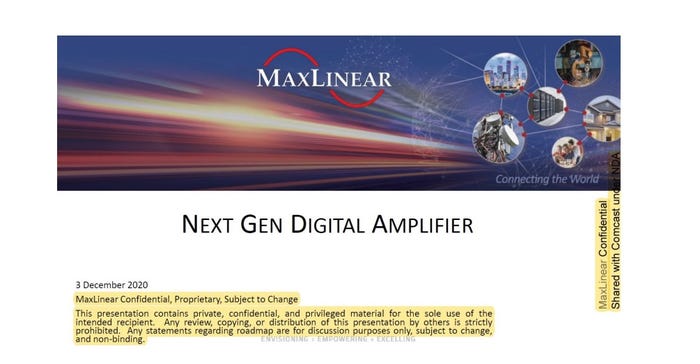MaxLinear: Comcast stole our FDX ideas
MaxLinear has filed a series of counterclaims accusing Comcast of misappropriating trade secrets related to Full Duplex DOCSIS technology and then hiring a 'competitor' – Broadcom – to commercialize it.

Comcast's breach of contract lawsuit against MaxLinear got a bit more heated after the chipmaker filed a series of counterclaims that included allegations that Comcast stole MaxLinear trade secrets related to Full Duplex (FDX) DOCSIS technology and then hired MaxLinear rival Broadcom to commercialize it.
Comcast denies the accusations.
MaxLinear's counterclaims against Comcast were filed December 1 in the US District Court Southern District of New York in response to a Comcast lawsuit filed in May against MaxLinear in that court claiming that the chipmaker breached its contract with the cable operator by scuttling a pair of agreements. Those agreements included a Vendor Support Agreement (VSA) and Statement of Work (SOW) related to updates and the technical upkeep of millions of DOCSIS cable modems that contain MaxLinear chips. Comcast argued that the VSA contains a critical "covenant not to sue" clause.
MaxLinear: We shared 'key inventions' related to FDX with Comcast
In its counterclaims, MaxLinear asserted it had been servicing Comcast's devices under the agreements "at no charge" but decided to terminate them on the belief that Comcast stole MaxLinear's ideas and trade secrets related to FDX, a technology that is central to Comcast's DOCSIS 4.0 rollout. Meanwhile, CommScope has been tapped to develop an FDX amplifier for Comcast that was involved in recent tests that delivered symmetrical speeds of 4 Gbit/s.
MaxLinear, which got deeper into the DOCSIS game following its 2020 acquisition of Intel's home gateway business, said it shared "key inventions and technological know-how" with Comcast related to FDX under a non-disclosure agreement (NDA) in the hope that the operator would then be incented to purchase and deploy MaxLinear's technologies.
"While Comcast simultaneously lauded MaxLinear's new technology as part of its future plans, Comcast scaled back its existing purchase orders of MaxLinear products and ultimately ceased the purchase of any new MaxLinear products altogether," MaxLinear claimed. "And rather than pay MaxLinear for an innovative, highly confidential, and proprietary technology that MaxLinear developed for and demonstrated to Comcast to allow it to succeed in the fiber-optic age, Comcast stole the idea, claimed it as its own, and hired MaxLinear's competitor to commercialize it."
MaxLinear didn't refer to that competitor by name in the counterclaims. However, Broadcom, MaxLinear's primary rival in the DOCSIS tech sector, is clearly the competitor in question. Broadcom and Comcast recently announced they collaborated on unified silicon for DOCSIS 4.0 modems, nodes and amplifiers that support both flavors of the D4.0 specs – FDX and Extended Spectrum DOCSIS (ESD).
MaxLinear likewise held that a no-sue clause in the now-terminated VSA (MaxLinear has agreed to provide support to Comcast through May 23, 2024 – a year after Comcast received the termination notice) "does not excuse Comcast's theft."
"Nothing in the VSA gives Comcast carte blanche to steal from MaxLinear or willfully and knowing disregard MaxLinear's intellectual property rights," MaxLinear claimed.
Comcast: Our FDX amp tech was 'independently created'
When asked for a response to MaxLinear's filing, Comcast held that its own engineers independently developed its FDX tech with "another trusted vendor."
"Comcast treats confidentiality and contractual obligations with the utmost respect, and contrary to MaxLinear’s claim, Comcast engineers independently created our FDX-amplifier technology in conjunction with another trusted vendor," Comcast said in a statement to Light Reading. "MaxLinear's allegations are completely without merit, and we look forward to demonstrating that in court."
Comcast filed a demand for trial by jury in its case against MaxLinear on December 8.
MaxLinear's timeline of events
MaxLinear's counterclaims also presented the chipmaker's view of FDX-related events with Comcast.
MaxLinear said it began to invest in and develop FDX technology in 2016 and then stepped up in 2020 to help Comcast explore an upgraded, FDX-compatible amplifier. The aim of that amp is to enable the cable operator to deploy FDX widely across its hybrid fiber/coax (HFC) network, rather than limiting its use to parts of the network where fiber was deployed deep enough to eliminate the need for amplifiers between the home and the node.
Believing its help would lead to future business with Comcast, MaxLinear said it was able to use its existing FDX knowledge to create an FDX-compatible amplifier by the end of 2020. That amp, the company added, utilized a "proprietary chip architecture" that enables upstream and downstream traffic to run in the same block of spectrum without being plagued with signal interference present in legacy amps.
Following a signing of a nondisclosure agreement in June 2020, MaxLinear said it then showed Comcast its "highly confidential and proprietary design along with other associated trade secrets to Comcast," and offered to work with Comcast on the final product.
MaxLinear claims that confidential disclosures in a private virtual meeting held in December 2020 included MaxLinear's FDX-amplifier design, layouts of the chip architecture used in that amp design along with test methods and performance benchmarks showing the viability of the technology.

Snippet of a cover page from a MaxLinear Next Gen Digital Amplifier presentation dated December 3, 2020. (Source: MaxLinear December 1, 2023, court filing)
"Comcast walked away from that meeting with a presentation deck that included the design and other MaxLinear trade secrets," MaxLinear claimed. "Although Comcast lauded MaxLinear’s accomplishment and enthusiastically asked for additional meetings to discuss commercial deployment (obtaining even more proprietary information about MaxLinear's FDX-amplifier solution under the cover of the NDA), Comcast ultimately decided to abandon MaxLinear, refusing to enter into any product agreement."
MaxLinear then claimed that Comcast "knowingly published aspects of MaxLinear's design as its own," including design elements that are "materially identical" to the one MaxLinear developed and shared with Comcast.
The chipmaker alleges that Comcast then shared those design materials with Broadcom and then paid Broadcom "to commercialize a functionally identical FDX amplifier."
MaxLinear's counterclaims accuse Comcast of breach of contract, unfair competition, and New York trade secret misappropriation. MaxLinear is seeking damages "to be determined at trial," including but not limited to lost revenues and profits, restitution, a "reasonable royalty," and punitive damages.
A fresh angle for MaxLinear
MaxLinear's counterclaims describing that the chipmaker terminated its VSA and SOW with Comcast because it believed the cable operator had stolen its FDX-related ideas represent a fresh angle, differing from some reasons referenced in earlier court filings.
In one of those earlier filings, Comcast said it was relayed that MaxLinear CEO Kishore Seendripu would abide by the VSA only if Comcast could convince the chipmaker "there is a solid chance of business in the future" between the two companies.
Similar reasoning emerged in a declaration from Will Torgerson, the VP and GM of MaxLinear's Broadband Group, filed in July. In it, Torgerson noted that MaxLinear executed the VSA and SOW in November 2020 "with the expectation that additional future business with Comcast would come to fruition."
"Instead, Comcast passed over MaxLinear for business opportunities, instead deciding to work with MaxLinear's direct competitor, Broadcom," Torgerson explained. "After nearly three years of this contractual relationship, it became clear that the Agreements had not resulted in the beneficial business relationship that MaxLinear expected … In order to deploy its staff and resources to other, more economically beneficial projects, MaxLinear decided that it needed to revise the parties' arrangement or otherwise terminate the Agreement."
Torgerson's declaration also references a May 18 meeting with Jon Cave, Comcast's SVP of broadband, Xfinity Home and entertainment devices, product strategy and management.
"In that meeting," Torgerson explained, "I relayed to Mr. Cave that MaxLinear intended to terminate its Agreements with Comcast unless Comcast could commit to developing the parties' business relationship on a go-forward basis. Comcast did not make that commitment."
MaxLinear sent its termination notice to Comcast that same day and it was received by Comcast on May 23.
The Entropic connection
Complications in the Comcast-MaxLinear case extend beyond the cable operator and the chipmaker.
Related to this case, a non-practicing entity called Entropic Communications LLC (Entropic LLC) acquired a portfolio of patents from MaxLinear related to Multimedia over Coax Alliance (MoCA) technology in early 2021. Entropic LLC has since filed patent infringement lawsuits against Comcast, Charter Communications, Cox Communications, Dish Network and DirecTV in a California court.
Comcast claims that MaxLinear and Entropic LLC "engaged in a scheme" that led MaxLinear to terminate its VSA and SOW agreements, thus voiding the no-sue clause and freeing Entropic to pursue its lawsuits against Comcast.
After trying to bundle MaxLinear and Entropic LLC under the same lawsuit in the New York federal court, Comcast was later forced to remove Entropic LLC from the federal case against MaxLinear and reassert its claim against Entropic LLC in a New York state court, where Comcast accused the patent owner of interfering with Comcast's contractual relationship with MaxLinear.
MaxLinear acknowledged in its counterclaims that it had assigned part of its patent portfolio to Entropic, but denied Comcast's allegation that the chipmaker is "closely related" to and working in concert with Entropic LLC.
Entropic LLC's namesake harkens back to Entropic Communications Inc., a MoCA chipmaker that MaxLinear acquired in 2015.
Update: The relationship between Entropic LLC and MaxLinear is also being debated in Entropic LLC's patent infringement case against Charter Communications.
According to a November 26, 2023, court filing in the Entropic LLC-Charter case, Entropic LLC purchased the asserted patents from MaxLinear on March 31, 2021 and entered a service agreement with MaxLinear on the same day. Later, on July 1, 2021, MaxLinear signed an agreement with Charter to develop cable modems compatible with DOCSIS 4.0.
As both agreements were being negotiated around the same time starting in mid-2020, Charter argued that MaxLinear should not be considered a third party.
The court agreed, finding there is a "genuine dispute of material fact" as to whether MaxLinear should be considered a third party.
"Charter has put forth a plausible argument that MaxLinear should not be considered a third party here based on its continued involvement pursuant to agreements with Entropic," the court said. "Entropic does not contest MaxLinear's continued involvement in this action, only arguing that MaxLinear does not hold title to the patents and is not a party to this litigation."
Entropic's cases against Charter appear to have fizzled out. Court documents show that a California court was directed to close the case in October. On December 11, a Texas district court dismissed a different case with prejudice following a settlement between Charter and Entropic LLC made on December 10.
About the Author(s)
You May Also Like












